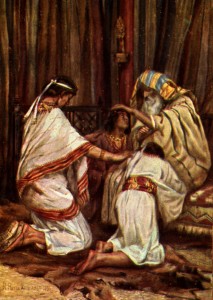Genesis 31:19, Household idols. Heb. teraphim, from rapha meaning “to heal, make healthful.” The ancient pagans viewed these idols superstitiously as good luck charms for good health and prosperity.
But there is more. In ancient Babylon, each family had a shrine where it worshipped its household gods, which were in the shape of clay figurines. These family gods served as guardian angels of the home, and would be left to the eldest son, who, acting as the family high priest, would perpetuate the family’s idol worship after the father’s death. The theft of these household idols left Laban in a very agitated state in that he was willing to pursue Jacob to retrieve them, by force, if necessary. The reason is that these gods conferred the right of primogeniture (to the firstborn son), and acted as a title deed to the father’s inheritance. Thus, Rachel must have stolen her brother’s inheritance thereby making Jacob the legal heir of Laban’s estate (Manners and Customs of Bible Lands, pp. 119–120, by Fred H. Wight; TWOT, p. 980).
Genesis 35:2, Foreign gods. Heb. teraphim. The necessary prerequisites to coming up to Bethel (Heb. the house of El/God) included: the putting away of the pagan idols that were among Jacob’s family members, removing jewelry with any pagan connotations (v. 5), purifying or cleansing oneself (physically and ceremonially), and changing into clean clothing.
Bethel, according to the Jewish sages, was where the Temple of Solomon was eventually built (i.e., the Temple Mount).
Because of this act of consecration, “the terror/fear of Elohim” came upon the Canaanite inhabitants of the surrounding region (v. 5).
What is the lesson here? There are two. When coming into the presence of Elohim, we would be prudent to consecrate ourselves, for Elohim is in heaven, and we are on earth; therefore, let us be careful not to offer up the sacrifice of fools (see Eccl 5:1–2).
And then, let us walk righteously and cleanly before Elohim, devoid of all pagan appearances and practices, and uncleanliness of all kind, including coming before him unbathed and wearing dirty clothing.
Friends, let me be frank. Our society has a dim view of church, Christians and Bible believers for many reasons. There is little or no fear of Elohim in our culture. Currently, Islam is on the rise. In general, there is both a fear of and respect for this religion. Where have we as Bible believers missed it in that the fear of Elohim does not go before us and come upon those around us?


